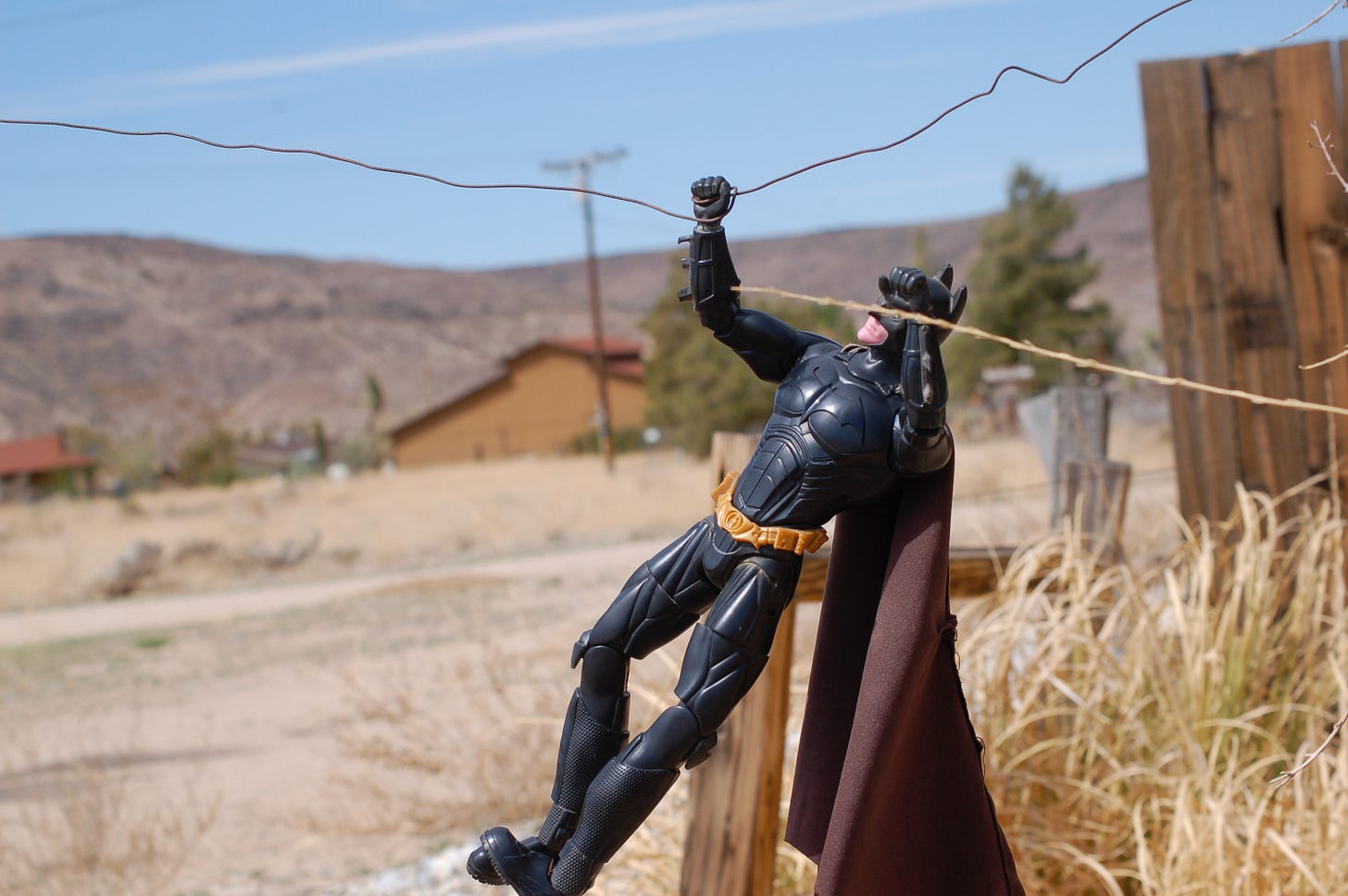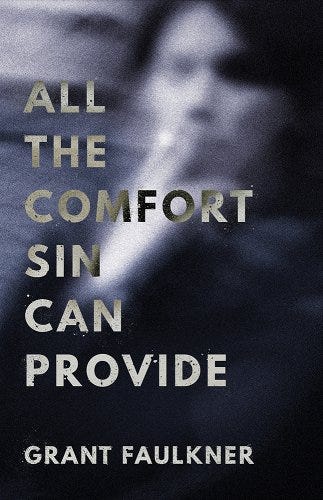Being a loser
and succeeding
Dear Readers,
I recently talked to a writer—a writer in distress. She’d received some negative feedback. She felt ostracized by her writing group. Other people in her workshop received more positive comments than she did. She felt like she’d blown her opportunity to impress the teacher, who she’d hoped would guide her to publication.
While she talked to me, she kept calling herself a loser. Over and over and over again. I’m a loser. I’m a loser. I’m a loser. It’s so tough to hear someone call themselves a loser with such force and conviction, such self-laceration.
Of course, she wasn’t a loser.
But we all feel like losers from time to time (even if you’re Batman, suddenly stuck, as in the photo above). In fact, because of the regularity of rejection you face as a writer—rejection that doesn’t come from just an admired writing teacher or writing group, but from editors and agents and friends and family and maybe even the person who bags your groceries—you’re likely to feel like a loser more than you feel like a winner.
That’s why I think we have to pause regularly and ponder what success is.
Is success getting a book published, becoming a best-selling author, hanging out with other best-selling authors, and being invited to speak at fancy conferences? Adulation from friends and family? Thousands of social media followers? Or the money that comes from a best-selling book and all the spa treatments and clothes you can buy as a result?
All of that is great, why not? But are those the reasons you picked up a pen the first time to write? After a good writing session, are such things the payoff that make it all worth it?
I know a writer who frequently compares her book sales to another. She monitors other people’s Twitter followers. She gets upset when others are invited to a conference and she’s not. We all have egos, of course. We all want to be loved. But when I hear her talk, I sometimes wonder why she writes. She has an agent, an editor, a book deal, but I wonder if somewhere along the way she lost track of the gift of it all—the gift she has to write a story, the gift she can give others through her story.
Gift is the key word. “To bestow one of our creations is the surest way to invoke the next,” writes Lewis Hyde in The Gift.
Hyde cites the story of Hermes, who invented the first musical instrument, the lyre, and gave it his brother, Apollo, who then was inspired to invent the pipes. One creation spawns another. Being an artist goes beyond the work of art you create. It will flow into your life and influence how you treat people, the way you love, the way you taste food, the way you stare up at the sky, the way you vote, the way you drive, the way you wash your dishes. Seriously.
I believe that living in reverence of our imaginations is the best way to preserve the essence of our being. Our art provides our spirit with a plenitude that can’t be found in any other way. Seizing our creativity for its own sake brings on an immediacy, a resplendency, and the urgency of our own possibility.
Our potency is defined by our ability to hear a story’s cries, no matter how faint. If we don’t write that story, our blood becomes anemic, our eyes fade to listlessness, our spirit atrophies. We must find nourishment within the work itself, not through any approbation or celebration others deem to grant us.
When you’re calling yourself a loser (which, if you’re like me, you will with piercing and damning regularity), it’s worth remembering the initial reason you picked up a pen.
We write so that we can speak back to the world.
We write to try to narrow the chasm between what we see and feel.
We write to penetrate into the unseen worlds around us.
We write because we’ll feel empty if we don’t.
We write because we’ve witnessed something that others need to hear about.
We write because in this world of data collection and data analysis, we know there’s a poetic truth of life that matters more.
We write to hear ourselves, and in hearing ourselves, to save ourselves.
Every story creates the writer to write it. It doesn’t matter if no one in the world wants that story. It only matters that we want it.
Write.
Because I think you’ll like my webcast
Each week on Write-minded, my co-host Brooke Warner and I interview a wonderful author and delve into writing and publishing topics to provide real talk about the ups and downs of the writing life.
This week’s episode with Zakiya Dalila Harris, author of The Other Black Girl, was an especially a good one.
Because a quote
“Life is like playing a violin solo in public and learning the instrument as one goes on.”
~ Samuel Butler
Because a haiku
When the fly rubs its legs I'm always a little scared
Because it can be good to be uncomfortable
"... I feel battered around by this poem, in a good way. I sometimes want a poem to abuse me a little, abuse my trust and shock me, to be quiet and then suddenly loud."
Elisa Gabbert wrote a beautiful essay on the "lyric decisions" a poet makes in writing a poem.
Because a writing prompt
Write a story that begins with this sentence: “The afternoon Burl Collins decided to streak through the town square, I was …”
Because Sweet Ruin
A great joy. A writer who listened to me speak about my collection of short stories, All the Comfort Sin Can Provide, sent me a poem, “Sweet Ruin,” by Tony Hoagland, because she thought it spoke to some of the same themes I was dealing with.
It’s such a lovely, mysterious, piercing, haunting poem. She was right: So many of my stories were written as if through the lens of this poem.
He paid the piper, was how he put it, because he wanted to live, and at the time knew no other way than to behave like some blind and willful beast, —to make a huge mistake, like a big leap
All the Comfort Sin Can Provide
If you like this newsletter, please consider checking out my recently released collection of short stories, All the Comfort Sin Can Provide.
Lidia Yuknavitch said:
“Somewhere between sinister and gleeful the characters in Grant Faulkner’s story collection All the Comfort Sin Can Provide blow open pleasure—guilty pleasure, unapologetic pleasure, accidental pleasure, repressed pleasure.”
Grant Faulkner is executive director of National Novel Writing Month and the co-founder of 100 Word Story. He’s the author of Pep Talks for Writers: 52 Insights and Actions to Boost Your Creative Mojo and the co-host of the podcast Write-minded. His essays on creative writing have appeared in The New York Times, Poets & Writers, Lit Hub, Writer’s Digest, and The Writer.
For more, go to grantfaulkner.com, or follow him on Twitter at @grantfaulkner.





Great words that landed at the right time for this amateur writer. I need to pick up the pen because I love to pick up the pen and make stories happen. If they’re good, if friends and family like them, that’s all gravy. The main thing is the love of writing. Thanks, Grant!
Excellent post Grant. Thank you.